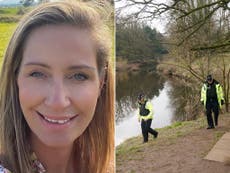Nicola Bulley – the missing woman who captured the imagination of a nation
We’re drawn to these stories as a way of educating ourselves about all possible dangers

I’ve written two novels about missing women like Nicola Bulley. Why?
Novels offer resolution. Loose ends are tied up. Endings are not always happy, but in most cases they give us closure. Baddies take many different forms, but always have one thing in common: they rarely get away with it.
What about true crime stories? In the UK there’s a rapidly growing choice of TV channels, festivals, books and podcasts encouraging amateur sleuths to examine unsolved and ongoing cases; no happy ending guaranteed. And, of course, we have the endless bombardment of breaking news.
So what’s the appeal? Why do we so desperately want to know the details of why and how bad things happen to other people? Perhaps it’s a basic human urge.
We’re hard-wired to protect ourselves and our tribe.
We’re drawn to these stories as a way of educating ourselves about all possible dangers. If we can just understand what makes the bad guys tick then we might be able to avoid falling into their traps. The more we read, the more we’ll learn. We’re not sick. We’re just trying to stay safe.
Or is it something darker? Does it make us feel better to know this unimaginable suffering is happening at a distance? Maybe deep down we believe that every time we read about a missing woman or a murder it shifts the odds in our favour, makes it less likely that the same thing could happen to us.
We choose to forget the fact that everyone is family to somebody. And if the whole thing gets too uncomfortable? Just swipe or scroll. Watch a kitten video until curiosity coaxes you back to the story, and the desperate need to know how it ends takes hold. Refresh, refresh, refresh.
So where does that urge come from?
Newspaper sites and social media are awash with images of the bench where missing mother-of-two Nicola Bulley’s phone was found almost two weeks ago. One of the great things about the internet age is how quickly and effortlessly the details of missing people can be distributed far and wide. It’s the right thing to do, and it helps.
Many of the pictures circulating were taken by police or the press – but some were captured by people who’ve visited the riverbank in recent days to take selfies by the bench. They’ve been branded as “ghouls” by the press, and slammed by those who know Bulley.
When I heard of it my first reaction was disgust, abhorrence, disbelief.
The first question I asked myself was: has social media stripped us of shame? Followed closely by: what’s behind this desperate need to be part of the story? All human action is driven by the desire to feel a certain way. So if I travel for miles just so I can take a photo of myself beside that bench, what’s the feeling I’m hoping to achieve?
I think evolution may have the answer. On a basic level, it’s about wanting a viral post on social media. Get a million likes and shares and you’re famous; momentarily loved. Sadly, it’s got little to do with helping Bulley or her family. On a deeper level it’s tribal: feeling like you’re actively part of something; that you’ve got some kind of role to play in an important and desperately tragic story.
That’s what happens when the news becomes just another narrative. The lines between real life and social media are so massively blurred these days that many people can’t see what lies just beyond that riverbank and that now-familiar bench.
Not too far away, real hearts are breaking.
The people who love Bulley are desperate for any sighting of her. All they have right now are unanswered questions and an agonising absence that internet speculators and armchair conspiracists seem happy to fill with the very worst of endings.
Pics or it didn’t happen, social media says. For once, I’m seeing the hope in that phrase.
Emma Christie was shortlisted for Scottish Crime Book of The Year 2021 and Scottish Crime Debut of The Year 2021





Join our commenting forum
Join thought-provoking conversations, follow other Independent readers and see their replies